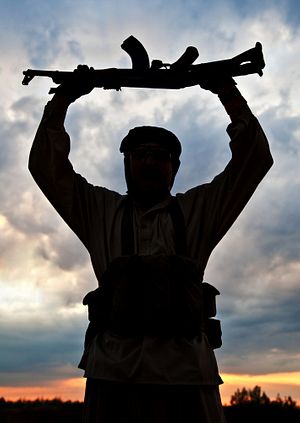This week in China news:
The New York Times reports that the Iraqi Defense Ministry claims to have captured a Chinese man who was fighting for the Islamic State (IS) jihadist group. The ministry posted pictures of the man to its Facebook page but has not released any further information (including clarification of how the man was identified as Chinese). While details of this particular case are scarce, it’s generally agreed that there are Chinese nationals involved in Middle Eastern conflicts. Former Chinese Special Envoy to the Middle East Wu Sike estimated in July that there were about 100 Chinese being trained or fighting in the Middle East. IS leader Abu Bakr al-Baghdadi has also claimed that there are Chinese nationals among Islamic State fighters. However, no Chinese nationals have been definitively identified as being involved with IS. If the Iraqi Defense Ministry’s prisoner is confirmed to be Chinese, he would be the first.
In other news, U.S. National Security Advisor Susan Rice will travel to Beijing on Sunday for a three-day visit, her first to China since assuming her post. According to China’s Foreign Ministry, the visit will allow both sides to “exchange views on China-U.S. relations and other important issues of common interest.” The U.S. National Security Council echoed these comments, with the addendum that Rice “will underscore the United States’ commitment to building a productive relationship between our two countries in advance of the President’s visit to China in November.” U.S.-China relations are at something of a nadir after a mid-air confrontation between a U.S. surveillance plane and a Chinese fighter jet. Both sides have traded barbs and blame for the incident. Rice’s visit is likely an attempt to smooth over tensions and get the relationship back on track.
In that regard, Xinhua has a number of suggestions for how Rice can make the most of her visit. The piece gives an approving nod to Rice’s earlier comments that the U.S. will seek to “operationalize” the idea of “new type great power relations” with China. However, Xinhua scolds Washington for not making good on this promise, saying “There are times when Washington discards its own commitment and opts for provocations out of fear for Beijing’s growing economic prowess and regional clout.” The article also bemoans the “bad tradition” of Washington “taking China as a scapegoat for its own messy domestic and foreign policies.” Xinhua urges Rice to reaffirm the United States’ “sincerity to Beijing by treating it as a true partner.”
Over at War on the Rocks, David Wise debunks “the myth of a friendless China,” the general perception that China has alienated most its neighbors. The flip-side of the “friendless China” myth is that the U.S. has many friends and partners willing to help it contain Chinese aggression. As Wise argues, there’s some truth to this viewpoint, but accepting it at face-value is a dangerous over-simplification. Wise notes the growth of the Shanghai Cooperation Organization, China’s pet project, as a sign that Beijing is in fact gaining partners in Asia. This fall, the SCO is slated to grow beyond the Central Asian states to include Mongolia, Pakistan, Iran, and India. The latter is especially important; India’s inclusion in the SCO provides further evidence of Prime Minister Narendra Modi’s wish to emphasize friendly relations with Beijing. Wise also ties the SCO expansion to the new BRICS bank as evidence of China’s increasing influence and ambition. Those who continue to assume China is “friendless” do so at their own peril.
Finally, in Chinese domestic news, Xinhua reports that the State Council has announced plans to “completely overhaul the exam and enrollment system for high schools and colleges,” including the infamous gaokao university admission exam. The reforms, scheduled to be in place by 2020, are “aimed at easing pressure, promoting fairness and increasing supervision,” according to Vice Education Minister Du Yubo. For one thing, the gaokao will be split into various portions that will be taken throughout high school, avoiding the massive senior-year crunch. The reforms also aim to shift away from an “overemphasis on [test] scores” by “standardizing the comprehensive evaluation of high school students.” There were no details as to what new factors will be considered under the “comprehensive evaluation.” Pilot gaokao reform programs will begin this year in Shanghai and Zhejiang.

































